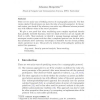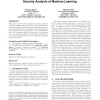145 search results - page 6 / 29 » Adversarial learning |
124
Voted
COLT
2010
Springer
15 years 16 days ago
2010
Springer
We study the regret of an online learner playing a multi-round game in a Banach space B against an adversary that plays a convex function at each round. We characterize the minima...
115
click to vote
ENTCS
2006
15 years 2 months ago
2006
There are two main ways of defining secrecy of cryptographic protocols. The first version checks if the adversary can learn the value of a secret parameter. In the second version,...
120
Voted
NSDI
2008
15 years 4 months ago
2008
Using statistical machine learning for making security decisions introduces new vulnerabilities in large scale systems. This paper shows how an adversary can exploit statistical m...
104
Voted
CCS
2009
ACM
15 years 9 months ago
2009
ACM
We propose a framework for quantitative security analysis of machine learning methods. Key issus of this framework are a formal specification of the deployed learning model and a...
116
Voted
CRYPTO
2012
Springer
13 years 5 months ago
2012
Springer
We present a compiler that converts any circuit into one that remains secure even if a constant fraction of its wires are tampered with. Following the seminal work of Ishai et al. ...


